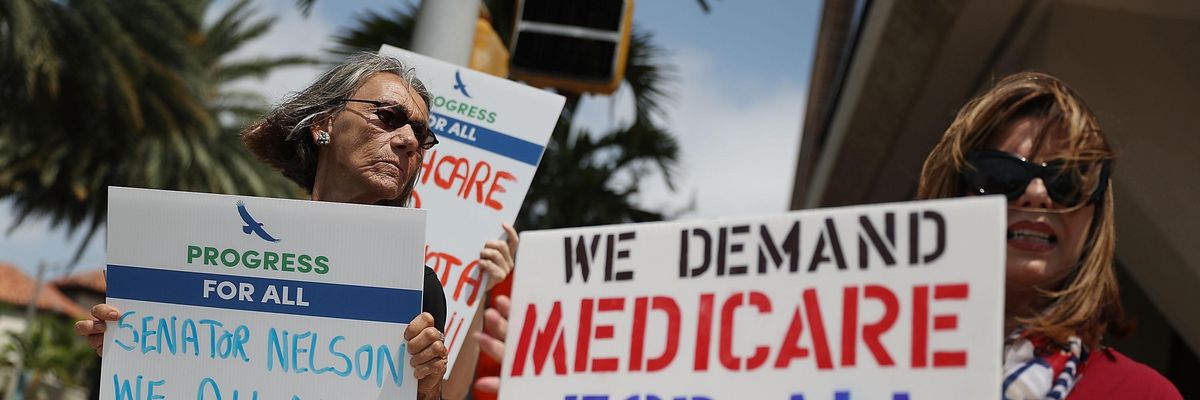The latest Republican effort to plan to repeal the Affordable Care Act--getting rid of the law without replacing it--appears to have stalled less than 24 hours after being introduced, as three Republican senators have come out against the proposal.
Senators Susan Collins (R-Maine), Lisa Murkowski (R-Alaska), and Shelley Moore Capito (R-W. Va.) all confirmed Tuesday that they would not vote for a plan to repeal the ACA, also known as Obamacare.
Majority Leader Mitch McConnell (R-Ky.) told the press Tuesday afternoon that he was holding out hope for a vote. "Sometime in the near future we'll have a vote on repealing Obamacare," he said. "I would remind everyone that in that proposal there's a two year delay which would give us the opportunity to work out a complete replacement on a bipartisan basis with our Democratic friends."
According to analysis from the Center on Budget and Policy Priorities, a repeal of the healthcare law would have catastrophic consequences for tens of millions of Americans who would lose coverage, as well as those who would see their healthcare costs rise 20 percent almost immediately, and 100 percent over the next decade.
But despite reports that say both that Obamacare is more popular among Americans than plans to repeal it, and that it has given health coverage to 20 million Americans who didn't have it before the law was passed, Republicans are desperate to make good on their seven-year-old promise to get rid of the legislation.
Vice President Mike Pence was succinct in his message to lawmakers on Tuesday: "Congress needs to step up, Congress needs to do their job and Congress needs to do their job now." On Twitter, President Donald Trump admonished all of the senators--all 46 Democrats, both Independents, and four Republicans--who didn't support the earlier Republican healthcare plan, which had a 17 percent approval rating among Americans and which the nonpartisan Congressional Budget Office (CBO) said would take coverage away from 22 million citizens. He also urged Republicans and Democrats to work together to come up with a new plan.
On the Senate floor Tuesday, Minority Leader Chuck Schumer (D-NY) urged cooperation between the two parties--with the intent of strengthening the ACA and abandoning plans to repeal it.
"The door is open right now, Republican leadership only needs to walk through it, as many Republican members are urging them," he said. "Republicans don't need to wreak havoc on our healthcare system first in order to get Democrats to the table--we're ready to sit down right now."
Schumer called for McConnell to return the Senate to regular order and stipulated that to push through any plan, the GOP must "abandon cuts to Medicaid [and] abandon huge tax breaks for the wealthy."
But many in the Trump resistance movement say that while those restrictions are key, the ultimate goal should be not to improve the ACA, which allows Americans to buy health insurance from state-run marketplaces, but to guarantee healthcare for every American with a single-payer or Medicare for All system.
Sen. Bernie Sanders (I-Vt.) said earlier this month that he would introduce a Medicare for All on the Senate floor, should the Republican plan fail. And Sen. Elizabeth Warren (D-Mass.) has also implored her fellow Democrats to embrace the idea.
As for voters--according to a recent Pew Research poll, a growing number of Americans support a single-payer healthcare plan. Thirty-three percent of Americans are in support of Medicare for All, up 12 points since 2014 and five points since January.

